
How to select the best probiotics and what to watch out for!
[sc name="Affiliate Disclosure"]
You have probably heard that probiotics are good for you and maybe you have even bought some. But did you buy the right kind? Are you confused and overwhelmed by all the choices out there?
Let me break it down for you so that you know if you should buy probiotics, what to look for when buying probiotics, and where to buy probiotics. At the end of this blog post, you will know everything you need to know to be a smart shopper...at least when it comes to probiotics!
What is a probiotic?
Probiotic literally means "for life". They are the good bacteria that live mostly in our gut, but also on our skin and in and around just about every orifice of our body. Fun stuff, right? They help us absorb nutrients and support our immune system. Actually, scientists think they do a whole lot more but we won't get into that today, just know they are really important for your health.
Without enough of these good little organisms, we are much more susceptible to digestive disorders, skin issues, yeast overgrowth (also known as Candida), autoimmune diseases, colds, the flu, even certain nutrient deficiencies. Not to mention overgrowth of the "bad guys" or disease-causing bacteria, yeast, and other organisms.
Historically, humans consumed a whole lot more of these helpful microorganisms. This is because we ate a lot more fermented and preserved foods due to the lack of refrigeration. We also consumed healthy soil remnants (which contained good probiotics) on some of the fresh foods we ate. Now we ultra-clean our foods with chemicals that destroy all bacteria, both good and bad. Plain and simple, we just aren't ingesting as many probiotics as humans did in the past.
Do I need a probiotic?
If you are eating a daily dose of probiotic-rich foods and are in good health then you probably don't need an extra supplement. Before you check the "in good health" box, keep reading...
If you answer "yes" to any of the following questions, then you should consider taking a supplemental probiotic, at least short term until you get your system in optimal health.
Have you taken antibiotics in the last couple of years?
Did you take antibiotics chronically as a child?
Do you eat 1 serving or less of probiotic-rich foods per week?

Do you experience any of the following symptoms on a regular basis?
gas
bloating
belching
mucus or undigested food in stools
diarrhea or very loose stools
constipation or going 72 hours or more without a bowel movement
indigestion
heartburn
pain or straining with a bowel movement
embarrassment after a bowel movement due to the smell (not saying it should smell like roses but stools shouldn't smell so bad that you don't want anyone to enter the bathroom afterward!) or due to the size (you need to use a plunger every time)
chronic bad breath
yeast infections
UTIs
hormone imbalance (very heavy periods, severe PMS, hormone-related headaches, and more)
Are you planning to travel abroad in the near future? (See details on Saccharomyces boulardii below)
Are you about to go on a round of antibiotics? (See details on Saccharomyces boulardii below)
If you answered yes to one or more of these questions, then keep reading to learn how and where to buy probiotics the smart way.
Probiotic supplements are not all the same.
There are certain probiotics that are made for very specific situations and then there is the majority of the rest that you will find on the market - those are made to support overall health. I will talk about one specific strain that is amazing for you to have in your medicine cabinet, and then I will give you advice on choosing a probiotic for improving overall health.
Saccharomyces boulardii




One probiotic that is recommended for very specific situations and one we have on hand at all times because it is so effective for the following issues is Saccharomyces boulardii.Used For:
to prevent and treat traveler's diarrhea
antibiotic-associated diarrhea (you can take this preventatively and it is not destroyed by antibiotics!)
occasional diarrhea
combats bacterial, fungal and parasitic infections
usually safe for people with SIBO
I keep this product on hand at all times. At the very first sign of the stomach flu, we pop these capsules every 1-2 hours and most of the time that "icky" feeling goes away quite rapidly. We also take this probiotic with us when we travel, no refrigeration needed! It's anecdotal, but our family has stayed healthy taking this probiotic as a prophylactic while traveling through Thailand, Europe, Australia, Indonesia, and other places. For kids or those who can't swallow, the capsules can be opened and sprinkled in juice or on food.
There are other probiotics used for very specific conditions but I would seek out the guidance of a healthcare professional when using them.
However, I DO encourage you to read further and learn more about how to choose a well-rounded probiotic to improve your overall health!
How to choose a good probiotic.
There are quite a few aspects to choosing a good probiotic, so let's dig in a bit so you can understand a few of the basics when shopping for one.
Potency
Probiotics are measured in CFUs or Colony Forming Units. The higher the CFU number, the more beneficial bacteria you are swallowing. In most cases, you want to see this number in the billions not millions. For a little perspective, there are around 100 trillion, or 3-5 pounds, of bacteria in your body as you read this!
Variety in strains
We have an estimated 500-1,000 different kinds of bacterial strains in a healthy gut. So why would you buy a probiotic supplement with only one strain? There are some very specific, usually acute, situations where this is called for, but if you are trying to build up a healthy flora of good bacteria in your gut then you generally want a supplement with at least 5-10 different strains. Also, for this reason, switching probiotic brands can be helpful. Diversity!
Added ingredients
If you are following a strict diet without gluten, dairy, egg, soy or any other allergen, you will want to read the labels very carefully. Watch out for unwanted additives!
Quality assurance
Make sure the company is Good Manufacturing Practice (GMP) certified and by whom.
Check for a seal of approval by an independent organization. These “seals of approval” do not mean that the product is safe or effective; they provide assurance that the product was properly manufactured, that it contains the ingredients listed on the label and that it does not contain harmful levels of contaminants. Here are 3 organizations that offer "stamps of approval".
"Third party tested" for any specific claims a company might make is generally a good thing. For example, if a company claims their probiotic is "dairy-free" and you have a dairy allergy, you will want to see that this claim has been tested by a third party.
Check expiration dates
You would assume that when buying something new you wouldn't have to worry about an expiration date, but you should still check.
Special features
Some companies will promote a "time-release" or enteric coated capsule. Honestly, I've read both having this and not having this feature as "the way to go".
The companies who promote having a special coating say that more probiotics will survive the harsh stomach acid and so you don't have to take it with food. The companies that say you don't need a special coating claim the heat-processing to add the coating kills a bunch of the bacteria! (In response to this they add extra bacteria so that there are still adequate amounts of viable probiotics in the capsule.)
Ugh, what to do? You are fine either way - enteric coated or not. Flip a coin.
Where do I buy probiotics?
There are many options for where you can buy your probiotics. The tricky thing is, do you need to keep them refrigerated while shipping? Many online companies have practices in place to ship probiotics cold but it could cost you extra!
Often times, I will just buy probiotics at my local health food store or Whole Foods for this very reason. However, sometimes I can actually save money shopping for probiotics online, which offsets the additional cost of shipping cold and I get a way better selection for the same price more or less.
Vitacost.com
I actually signed up with Vitacost.com (this is a free membership!) years ago. They will often send me coupons to save anywhere from 10-30% off the already reduced price. So, I keep my personalized list of products handy on my Vitacost account and just re-order when I get a coupon. Sneaky? I think it's just being smart!
Now, I do have an affiliate relationship with Vitacost but only because I have used them for years and absolutely love their service, their selection and the quality of products they carry. So if you want to shop at Vitacost through the link below, I will earn a small commission at no extra cost to you, which helps me to keep writing free content like this blog post!
Check out Vitacost's coupons, deals, and discounts today! Free shipping on orders over $49.
Local Health Stores or Grocery Stores
Another place to shop is your local health food store as I mentioned before. If you are lucky, you may even run into a knowledgeable salesperson who can help you decide which product to choose. But beware, ultimately, they are there to sell you something.
Amazon
Try Amazon for your health needs. I have actually bought some of my supplements here after searching everywhere else and only finding it on Amazon! I was shocked! Plus, 2-day Prime shipping (if you have it) is pretty nice when you wait until the last minute and run out of your daily supplements.😳 #procrastinationismymiddlename
Once again, I have an affiliate relationship with Amazon, so if you want to shop through my links, I will earn a small commission at no extra cost to you, but it helps me to keep writing free content like this blog post!
Health Care Professional
Lastly, you could seek the guidance of health care practitioner for specific guidance on choosing probiotics and other nutritional supplements. Often, these practitioners will carry pharmaceutical grade products in their office or online. Pharmaceutical grade is considered to be the highest quality.
How to properly store your probiotics
Make sure you read the bottle carefully as many probiotic products require refrigeration. You will also want to make sure that you don't introduce moisture to the bottle by handling the capsules with a wet hand or leaving the bottle open. Think of supplemental probiotics as if they were in hibernation, warmth and moisture will signal them to wake up!
There are some probiotics that are shelf-stable and these are the kind that are great for traveling! According to Dr. Natasha Campbell-McBride MD, some of the best kinds of bacteria are hardy enough to withstand room temperature storage. You don't have to store these probiotics in the fridge, but you can if desired. If a package doesn't say anything about refrigeration, you can assume it is not needed.
Bottom line - needing to be refrigerated versus not needing to be refrigerated does not indicate a good or bad quality product. Quality depends on the other factors I listed.
A few of my favorite probiotic brands:
These brands are all high quality, have been extensively reviewed with great marks and are easy to find. This isn't a comprehensive list, there are many other great brands out there, but these are the ones I have had great personal experience with.
Garden of Life
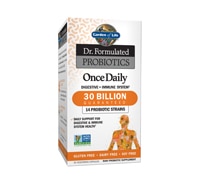
Renew Life
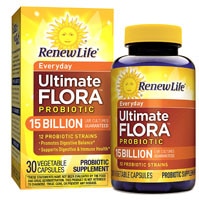
MegaFood
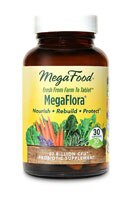
BioKult
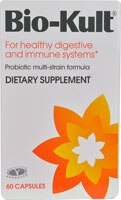
Innate Response Formulas
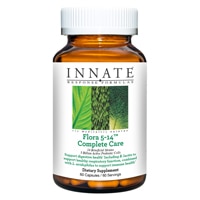
Florastor


Jarrow
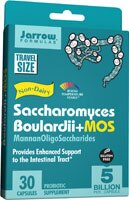
Let's look at a label
Here are a few of the criteria we talked about that you might find on a label. All labels are different, but you can see some of the main things to look for on this example label.

Now you are ready to shop!
So now you are well versed in how to buy a probiotic supplement. As always in the world of dietary supplements, it's rare to find "proof" that something will work for you, but in most cases, it won't hurt to try. Probiotics have a great reputation for helping many people overcome health conditions. I think you are hurting yourself by not giving them a try if you are suffering from certain health issues like gastrointestinal symptoms, depression, weight gain, hormone imbalances, and more.
Switch it up! Don't fret too much over which probiotic to start with. Always choose good quality ones but switch brands and products from time to time. Having exposure to a variety of strains is usually beneficial to our guts. Diversity is great! Consider your body like a financial investment plan. Consistent and diversified deposits are what you want.
I hope this helps you make an informed decision. Please feel free to send me any other probiotic questions!
Shop for Probiotics where I shop!
[sc name="Medical Disclaimer"]
